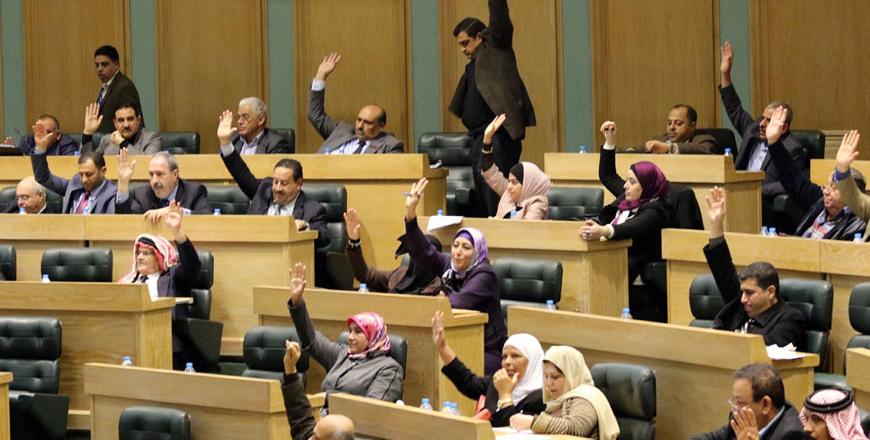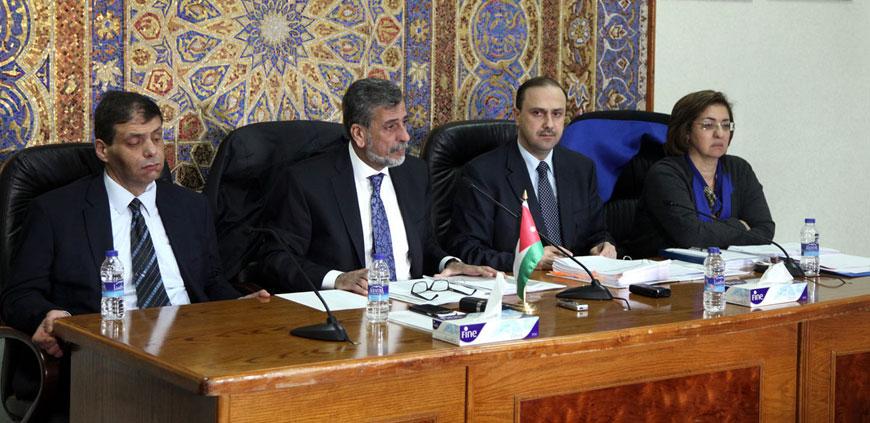You are here
House passes elections bill with minor changes
By Raed Omari - Feb 23,2016 - Last updated at Feb 23,2016

Lawmakers vote for the 2015 elections bill on Tuesday (Petra photo)
AMMAN — The Lower House on Tuesday passed the draft 2015 parliamentary elections law with minor changes following six marathon sessions that began Sunday.
With the endorsement of the bill, all political reform-oriented laws are now completed, after three key pieces of legislation have been passed, namely the Political Parties Law, Decentralisation Law and Municipalities Law.
The notorious one-person, one-vote electoral system, which was introduced in 1993, is history under the version of the law adopted by MPs. The new law is based on the at-large voting system in which candidates can run for parliamentary elections on one large multi-member ticket.
The number of Lower House members was reduced to 130 from 150 under the 2015 elections bill, which is based on the open proportional list at the level of the governorate/constituency.
Under Article 9 of the 68-article law, eligible voters will have a number of votes equal to the number of seats allocated for their district in the Lower House.
During the elections, each eligible voter has to vote for a multi-member list as a whole and for individual candidates of his/her choice from the same ticket.
Under the 2012 law, on the basis of which the 2013 parliamentary elections were held, each voter was given two votes: one for a candidate at the district level and another for a closed proportional list that competed for 27 seats at the national level.
The House endorsed a provision dividing the Kingdom into 23 electoral districts, one for each of the 12 governorates, except for Amman, which was split into five districts, Irbid into four and Zarqa into two, while each of the three badia districts (northern, central and southern) was considered a governorate for the purposes of the bill at hand.
The draft law allocates 115 seats for the constituencies and 15 seats for a women’s quota: one seat for each governorate and one seat for each badia district.
The draft law stipulates that running for elections for women’s seats has to be within tickets without affecting the maximum limit of candidates in the list.
The draft law also stipulates that each ticket include no fewer than three candidates and not exceed the number of seats allocated for the constituency in which the ticket is competing.
The draft law stipulates that candidates for Circassian, Chechen and Christian seats can only run through lists in the districts where these groups have been designated seats in the House.
The proportional electoral system allows winning lists to have seats according to what they achieved of the total percentage of votes cast, and these seats won will be distributed among the ticket members depending on the number of votes each candidate has garnered.
People in public office, including ministers, ministry employees, and mayors, are not allowed to run for the elections unless they resign their posts at least 60 days before the date of voting.
According to the draft law, anyone who intends to run for the elections must be registered in the final voter lists and unlike the draft submitted by the government, which said they must pay JD1, 000 each, nominees must pay only a non-refundable JD500 to the Treasury.
Related Articles
AMMAN — The Lower House on Sunday endorsed the Upper House’s amendments to the 2015 elections law, the last in a reform-oriented legislative
AMMAN — The Cabinet has endorsed the validating reasons for the draft electoral constituency by-law, which divides the country into 23 const
AMMAN — Women’s groups on Tuesday said they had hoped the 2015 draft elections law would have included a 20 per cent quota for women.On Mond












